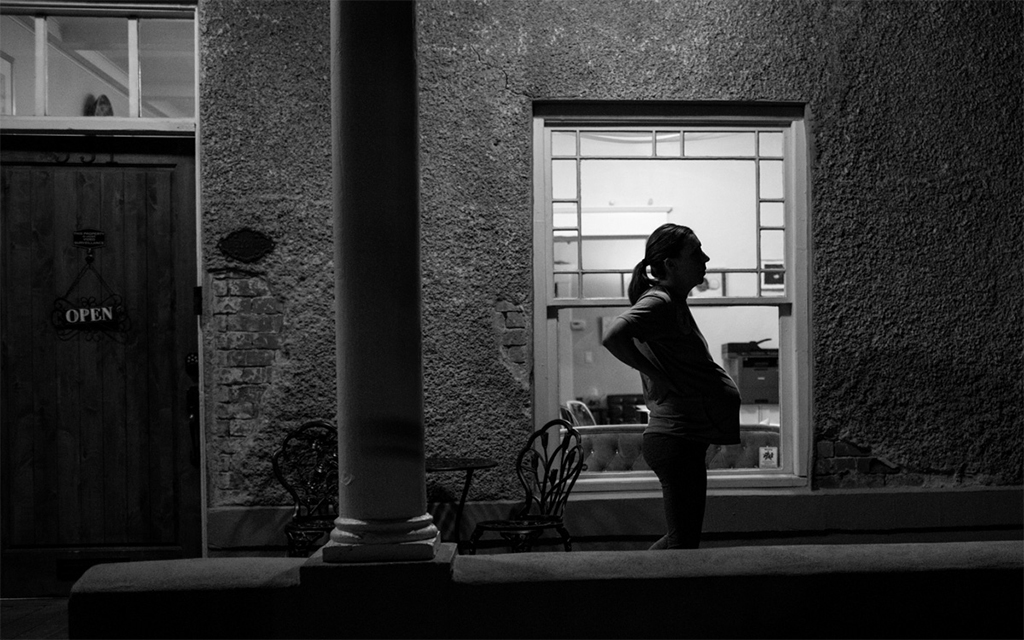
An expectant mother paces outside a Phoenix birthing center while experiencing labor contractions in this 2021 photo. The most recent Arizona Department of Health Services data shows that infant mortality in the state rose from 5.47 deaths per 1,000 births in 2021 to 6 deaths per 1,000 in 2022. (File photo by Nicole Neri/Cronkite News)
PHOENIX – The Arizona Department of Health Services (AZDHS) released a report that shows an 11% increase in infant mortality rates from 2021 to 2022. The rate of infant mortality in Arizona in 2022 was 6 for every 1,000 births. Previously it was at 5.47
Across the U.S. the rate was 5.6 for every 1,000 births in 2022, according to a National Vital Statistics System report that put Arizona’s infant mortality rate at 6.17 for the year. Other developed countries such as the United Kingdom, Spain and Iceland have infant death rates in 2023 of 3.337, 2.011 and 1.055 per 1,000 respectively.
“The United States remains the most dangerous place for childbirth or birth outcomes out of all the developed nations in the world,” said Shadie Tofigh, director of infant and maternal health for March of Dimes, a nonprofit organization that advocates support for the health of mothers and their babies.
“Mortality is on the rise, simply because we as a nation are not investing and prioritizing our mothers and babies,” Tofigh said. “We spend the most but we have poorer health outcomes for our moms and babies versus countries overseas, who may not spend as much, but some do have better health outcomes.”
In Arizona, low birth weight is the leading risk factor for infants, present in about 63% of cases; poverty is the second most common factor, seen in 59% of the cases. Premature birth was the leading cause of death, cited in 206 of the 479 infant deaths in 2022.
“Around 140 babies are born premature each week in the state,” Tofigh said, “and right now, our NICUs (neonatal intensive care units) are at full capacity across the state of Arizona, so we are in a crisis.”
In the AZDHS report, boys accounted for 62% of the infant deaths attributed to premature birth. According to the National Institutes of Health, “This has been explained by sex differences in genetic and biological makeup, with boys being biologically weaker and more susceptible to diseases and premature death.”
Mitzie Warner is a Phoenix mom who had her son in 2016. When he was born, he was 1 pound 8 ounces. After birth, he spent four months in the NICU recovering and getting healthy. “You couldn’t even think,” Warner said, “and this is considering that we had medical care just right down the road. I can’t even imagine being in a situation where you reside in a maternity desert.”
“We’re getting letters from our insurance saying, ‘Oh, you may or may not have coverage because the third party is out of network,’” Warner said. “We had insurance but I mean, if we had to pay like out of pocket we’re looking at over $1 million. I was told that just to be in the NICU was $5,000 per day.”
According to HealthCare.gov, after a birth or adoption/foster care date, a parent has 60 days to enroll the child in a marketplace insurance plan.
As of April 1, 2023, Medicaid postpartum coverage has been extended to cover 12 months after birth; it previously covered only 60 days. Postpartum depression affects one in every 10 women within a year of giving birth.
Despite accounting for only 6% of the total number of live births in Arizona, Black infants made up 13% of infant deaths, while American Indian babies made up 5% of live births, but 8% of infant deaths.
Tofigh said that this is because structural and systemic racism that is embedded in the U.S. healthcare system hinders minority groups, particularly women, from accessing care.
Several Phoenix hospitals have recently closed obstetric units, including the Phoenix Indian Medical Center in 2020 and HonorHealth Medical Center, which closed its Osborn unit and is consolidating obstetrics at the Scottsdale Shea Medical Center location.
March of Dimes helped advocate for the renewal of the PREEMIE Act, which expands the research for mothers during pregnancy and aims to reduce preterm birth rates. The PREEMIE Act was originally passed in 2006 and was again renewed for five years in 2018 – bills that would extend it for another five years beyond the current Dec. 31 expiration are currently pending in both the House and Senate.
March of Dimes also offers Mom & Baby Mobile Health Centers that travel to rural areas and areas lacking maternal care. Several mobile centers are located across the country, including in Washington, D.C., Columbus, Ohio, and Tucson, which partners with the University of Arizona.

